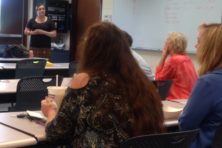Coordinated Community Response Column
- Share
- Tweet
- Pin
- Share
Despite the stresses of preparing for the holidays, most of us thoroughly enjoy this time of year visiting with family and friends, the food, the lights, the giving and getting of gifts. But for some survivors of childhood abuse it is one of the most difficult times of the year.
Many child abuse survivors feel obligated to attend family get-togethers or may want to attend to see those they love but also will have to contend with seeing one or more of their abusers. It still may not feel safe being around that person and just seeing them may cause physical and/or emotional reactions similar to those felt at the time of the abuse. Intrusive memories may make it difficult to function not only for the holiday, but possibly for some time afterward.
Some child abuse survivors may choose to not see family at the holidays as a way to avoid their abuser or to avoid those family members who don’t believe or support them. This is a particularly difficult time of year to be alone when those around you are celebrating with family. Perhaps the holiday is being celebrated in the home where they were abused and just being in those rooms triggers traumatic memories. For these survivors the holidays can be a difficult and lonely time.
It is always important when making holiday plans to decide what is in the survivor’s best interest. You can set whatever limits or boundaries you need to about where you’re going, what you’re doing and for how long. For some survivors of childhood abuse the decision may be to not celebrate the holidays, or it may be about establishing new traditions and rituals. Some survivors find new families to share their holidays with, whether that is their in-laws, or their neighbors, or their friends.
If someone in your family has been abused by another family member, be sensitive to their needs and understand that if they choose not to participate in the holiday get-togethers or limit their involvement that they can do so without criticism or anger from you or other family members.
An excerpt from The Courage To Heal by Ellen Bass and Laura Davis provides one perspective on the holidays for childhood abuse survivors: “Passover has always been an important holiday for me. My grandfather, the patriarch of the family, presided over Seders. He also molested me. I stopped going to family Seders because I couldn’t stand the idea of all my relatives sitting around talking about what a great man he was. So I make my own Seders instead. I always invite the same close friends. We eat the traditional foods—matzoh, hard-boiled eggs, bitter herbs—and sing the traditional songs, but instead of using the customary service, we write our own each year. Since Passover commemorates the Jews’ struggle for freedom, each of us talks about what the struggle for freedom means to us today. For me as a survivor, escaping from bondage has taken on a whole new meaning. Combining the old and the new feels liberating, which is what Passover is all about.”
This article is brought to you in part by the Door County Coordinated Community Response (CCR) to Domestic Violence and Sexual Assault Teams and the Door County Elder and Adult-at-Risk Interdisciplinary Team.

